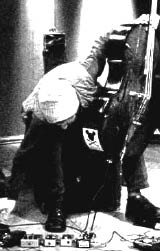Playing the Valentine Card
by Mike Shanley
Like many of his peers in the Chicago improvisation scene, Fred Lonberg-Holm can be heard regularly in a variety of settings. What’s especially unique about his musical resume is that his axe of choice is the cello, an instrument that isn’t exactly standard in jazz, free improv or any more conventional type of music, despite its sonic flexibility—especially when Lonberg-Holm is drawing the bow.
The cellist’s approach to structured material has added greater dimension to the Vandermark 5, one of the Windy City’s strongest modern jazz units. On one stop of their tour earlier this year, Lonberg-Holm added a greater dimension to the music’s predominantly acoustic texture, creating loops with effects pedals, or clicking the effects on and off rhythmically in a manner that bolstered Ken Vandermark’s saxophone solos. Thanks to the combination of his equipment and technique, his own solos often sounded a guitar being worked over by Jimi Hendrix.
The numerous projects that have performed under Lonberg-Holm’s direction have included moments of some especially fierce free improv as well as dry humor (one CD concluded with a traditional folk song about the dangers of tobacco). He has also torn things up as a member of the Peter Brotzmann Tentet and the Flying Luttenbachers, respectively a large ensemble helmed by the godfather of European free jazz and a Chicago band whose chaotic approach makes them sound as much like a punk band as a noisy jazz unit. In between Lonberg-Holm displayed a more conventional side on Yankee Hotel Foxtrot, Wilco’s landmark album.
The current Fred Lonberg-Holm Trio, with bassist Jason Roebke and drummer Frank Rosaly, recently released Terminal Valentine. It marks the third installment in a series of “valentines” that have previously paid homage to other musicians in both the jazz and pop realms. While it definitely shows a more lyrical side to his playing, the disc—an all-original set this time around—nevertheless has moments when the frenzy boils to the surface to keep things exciting.
Lonberg-Holm studied in New York with adventurous composers Morton Feldman and Anthony Braxton. There he turned up in a number of musical situations, from John Zorn’s “Cobra”—a “game piece” in which the leader conducted the musicians with a series of cards—to the agro-punk of God Is My Co-Pilot.
When he relocated to Chicago in the 1990s, the city’s fertile music scene gave him myriad opportunities for his wide range of musical interests. He began leading the Light Box Orchestra, an evolving group of improvisers which he conducted by using a—you guessed it—light box, signaling when different musicians should start playing. At the same time, he could be heard playing with Terminal 4, a group of area jazz musicians who played Lonberg-Holm’s instrumental pop songs. In a review of their first album, one writer compared it to the music of Burt Bacharach. Anyone expecting noisy cello scrapes might have been shocked, but for Lonberg-Holm, it was nothing unusual. “Since the early ’80s, I have been creating a body of work that has incorporated or synthesized aspects of popular music,” he states on the Web site for the disc’s label, Atavistic.
Five years ago, a Lonberg-Holm trio, with Roebke and Wilco drummer Glenn Kotche, released A Valentine for Fred Katz. It saluted the cellist/composer who essentially introduced that instrument to jazz in the 1950s as a member of Chico Hamilton’s cool California quintet, and went on to work with artists like Tony Bennett and “word jazz” performer Ken Nordine. It too showed a- reverent side to the diverse Lonberg-Holm, as he revitalized chestnuts like “My Funny Valentine” and “Autumn Leaves,” along with several of Katz’s compositions. Other Valentines followed in 2005, with the focus moving to the music of Sun Ra, poet/singer Gil Scott-Heron and Syd Barrett.

Terminal Valentine continues down the path charted by the previous two albums (Rosaly replaced Kotche on Other Valentines). Performing 10 original pieces, Lonberg-Holm comes across as a strong composer, able to draw an array of sonic colors out of a trio of instruments that could stay entrenched in low-end tranquility. “Three Note Song” opens the album with a bright waltz melody before the leader cuts loose with some feisty bowing. The theme of “Maybe It’s Too Late” contrasts loud, short cello bursts with long, quiet tones. “No One Will Ever Be Forgotten” warms up with a free exchange between Roebke and Lonberg-Holm, which eventually gives way to a melody that sounds as if it were drawn from a spiritual. “One For the Road” initially sounds like a drone piece, but upon further examination, it comes across more like a very slow blues that serves as a fitting farewell as the group heads down the next avenue, musical or otherwise.
In the time it takes to read this article, Fred Lonberg-Holm could very likely start work on three more musical projects and appear on a handful of CDs, each one different than the other. Musicians associated with music that often contains the words “free” or “avant garde” might have reputations as one-dimensional, but people like Lonberg-Holm prove that these very same musicians are more often the most flexible, open to more arenas than one would normally expect.
Fred Lonberg-Holm’s Valentine Trio performs at Hallwalls on Tuesday, June 26, 8pm. Free admission, though a $5 minimum donation is suggested. Call 854-1694 or visit hallwalls.org for more information.
|
Issue Navigation> Issue Index > v6n25: Mark Freeland, May 1, 1957-June 14, 2007 (6/21/07) > Playing the Valentine Card This Week's Issue • Artvoice Daily • Artvoice TV • Events Calendar • Classifieds |









 Current Issue
Current Issue